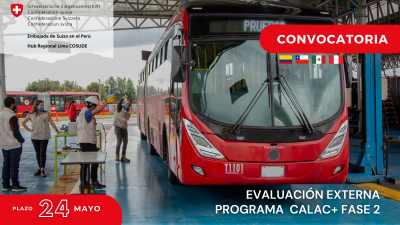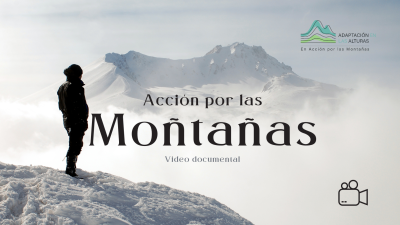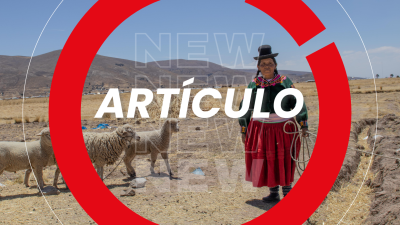The HRTWS offers a new perspective for public policy. The workshop focused on how private and civil society organisations can contribute to the promotion of the Human Right to Water and Sanitation by adopting inclusive business approaches.
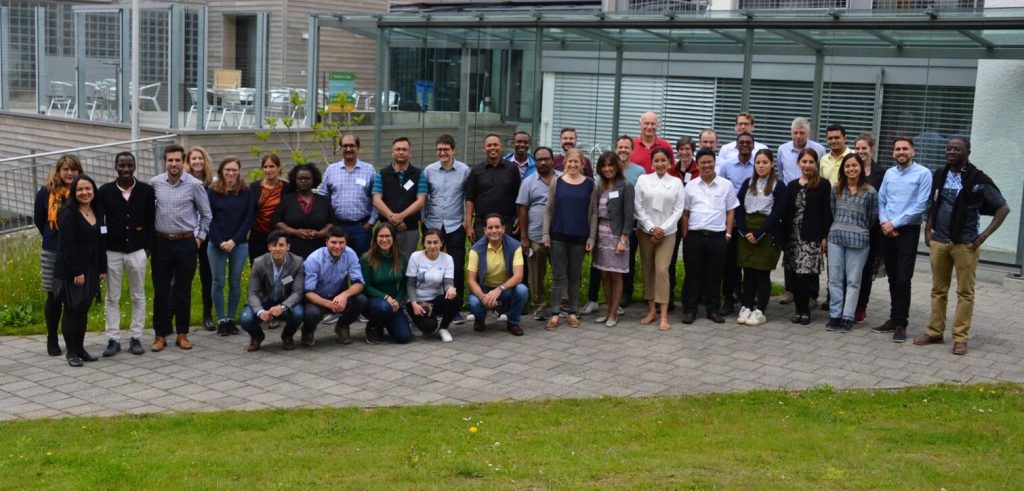
The 35th AGUASAN Workshop (2019) was held from 13 to 17 May 2019, in Spiez (Switzerland). This was an opportunity to analyse the most promising strategies and tools for countries to create workable HRTWS (Human Right to Water and Sanitation) ecosystems, so that inclusive companies can expand.
The 35th AGUASAN workshop was opened by the Steering Committee, who welcomed the 49 water and development professionals. The introduction round showed the participants’ rich and diverse experience and how they complement each other, providing technical, technological, legal and institutional expertise at the micro, meso and macro levels.
Raphael Graser of Antenna Technologies shared the successful and inspiring business model of SPRINGHEALTH in India, a social enterprise that delivers 120,000 litres of drinking water per day through local businesses that deliver water containers to the home.
The next speaker was Tatjana von Steiger, the Deputy Director-General of SDC’s Global Cooperation Department. She highlighted SDC’s approaches to promoting the HRTWS and underlined the fact that “systemic changes are necessary, so we need partnerships to establish stable frameworks. Peace and access to water is a precondition for attracting high-impact investors. The SDG concept is there, but we need pilots to fill it, that’s why this workshop is relevant”, she highlighted in his dissertation.
This was followed by a speech by Amanda Loeffen de WaterLex, focused on the two main questions: What is the human right to water and sanitation and what role do businessmen play?
Valentín Post went on toprovide practical information on waste, and the approaches which Dutch Development Cooperation uses for scaling up inclusive business. He showed the links between government, business, finance and communities.
The workshop was also a valuable opportunity for introducing six young innovative, promising, inspiring and brave entrepreneurs who presented their arguments and experiences in the field.
Participatory methodology
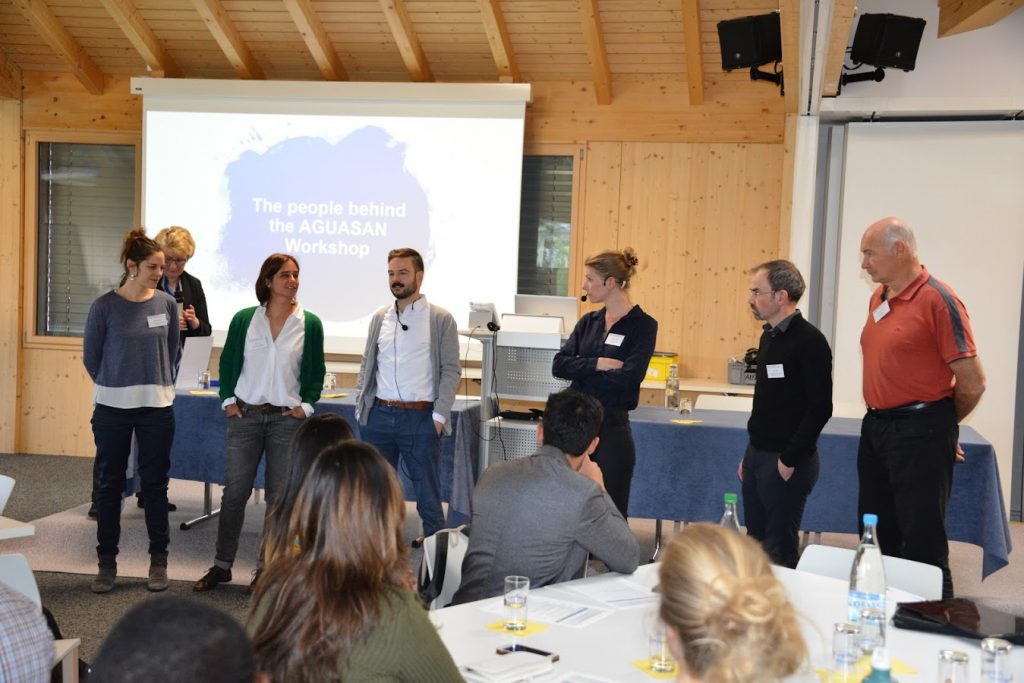
The workshop included real case studies in order to provide a solid, deep and practical foundation. These were shared, studied and developed during the group-work sessions. Participants formed six working groups for developing inclusive business approaches to promote the HRTWS.
The organisers had previously requested presentations from the non-profit organisations that have implemented an inclusive commercial approach to providing water and sanitation services to the Base of the Pyramid (BoP) and actively promote the HRTWS.
Global programmes participation
Kenneth Peralta of the Global Water Programme’s office in Lima shared his experience of implementing the portfolio projects in informal meetings with the participants, giving special emphasis to the water footprint project. SDC also supported the Colombian initiative “Tierra Grata” which seeks to improve access to water and sanitation in rural communities using social technologies and incorporating the human rights concepts.
The presentations can be found in the links below.
Day 1 presentations
1. Amanda Loeffen WaterLex, Human Rights to Water and Sanitation for small businesses
2. Nicolas Lorne, Due Diligence, Waterpreneurs
3. Amanda Loeffen, Checklist for small scale Sanitation and Hygiene Providers
Day 2 presentations
1. AGUASAN News 14th May 2019
2. Catarina de Albuquerque, Sanitation and Water for All
3. Adriaan Mol, BushProof, Interaction – Pro Poor Business Models
4. Erik Simanis, TIL Ventures
5. Mikael Dupuis, UDUMA, Sustainable model for rural water services in Burkina Faso and Mali
6. Bjoern Struewer, Roots of Impact
Day 3 presentations
1. 35th AGUASTAN News – 15th May 2019
2. Hester Foppen, Aqua for All, Utility-Led Distribution of Filtres in Ethiopia
3. Abu Rehan, SDC Pakistan
Day 4 presentations
1. Tania García ASIR, SABA
2. Selma Hilgersom, Simavi
3. Samir Adriano, Helvetas
4. Lucien Blaser, Helvetas
About AGUASAN
AGUASAN is an interdisciplinary Swiss community of practice that brings together a wide range of specialists to encourage a broader and deeper understanding of key water and sanitation management issues in developing and transition countries. It is based on committed sector professionals from various specialised institutions involved in Swiss development cooperation, humanitarian aid and research. Since 1984, AGUASAN has provided an exemplary, vibrant and relevant discussion platform and a group of experts at the service of the water sector, and is an essential link in the innovation and knowledge management strategy of the Swiss Agency for Development and Cooperation (SDC).
Desde 1984, AGUASAN proporciona una plataforma de intercambio y un grupo de expertos ejemplar, vibrante y pertinente al servicio del sector del agua y constituye un eslabón esencial en la estrategia de gestión de la innovación y el conocimiento de la Agencia Suiza para el Desarrollo y la Cooperación (COSUDE).
The community of practice holds quarterly knowledge-sharing events and organises an international AGUASAN workshop every year in Switzerland. At these events, water and sanitation specialists and other development professionals from around the world meet for five days to collectively reflect on a cutting-edge theme in the water sector. The workshops provide a joint learning experience and use the participants’ extensive knowledge to develop strategies and conceptual tools for practical use in development work, highly relevant to local, national and global sector interventions. They are the annual high point of AGUASAN and provide a unique forum for in-depth exchange and understanding by exploring new issues, while consolidating important experience.
About the Human Right to Water and Sanitation (HRTWS)
Water is a fundamental human right and is a precondition for guaranteeing other human rights such as the right to food, the right to health, the right to education for all and the right to adequate housing. The UN declared access to safe drinking-water and sanitation as a human right in 2010. Human rights criteria (availability, quality, acceptability, accessibility and affordability) and human rights principles (non-discrimination, access to information, participation, accountability and sustainability) shape the content and scope of the right and guide its implementation. This promise to “leave no one behind” was reinforced by Agenda 2030.
Source: Aguasan
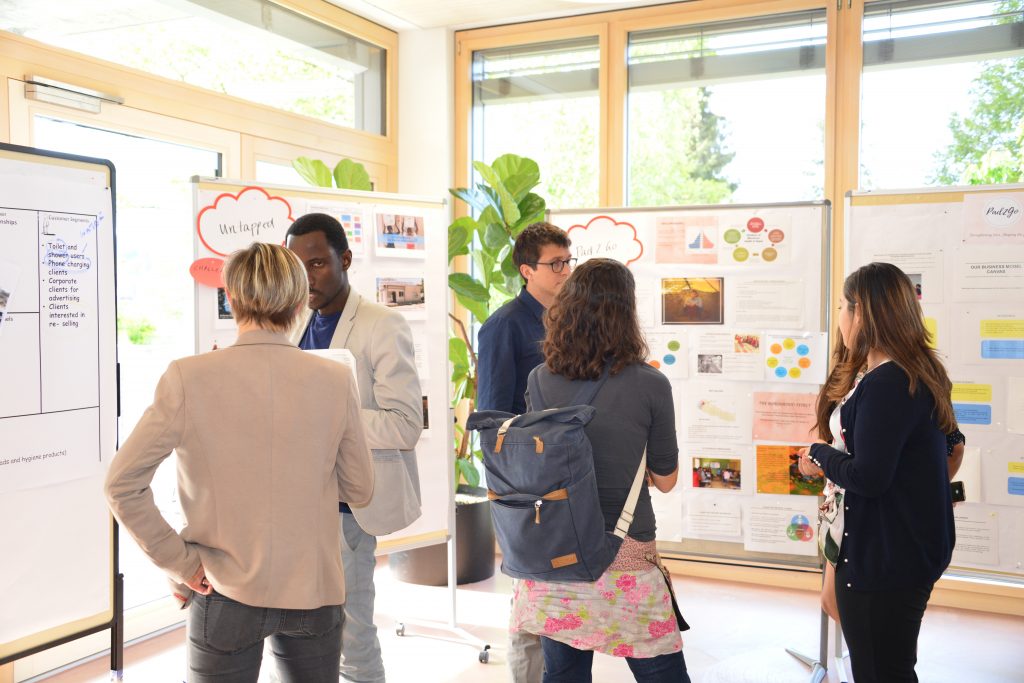
Vea la galería de imágenes aquí
MáFor further information:
(PDF) Bienvenida Aguasan 2019
(PDF) Lista de participantes
Web Aguasan
[1] El Comité Directivo está integrado por Hanna Capeder, COSUDE – Programa mundial de agua; Valérie Cavin, HELVETAS Swiss Intercooperation; Tandiwe Erlmann, seecon gmbh; Raphael Graser, Fundación Antena; Gérard Luyet, Servicios Industriales Genève; Julie Smolnitchi, Skat Consulting Ltd.; y Linda Strande, Eawag Sandec


